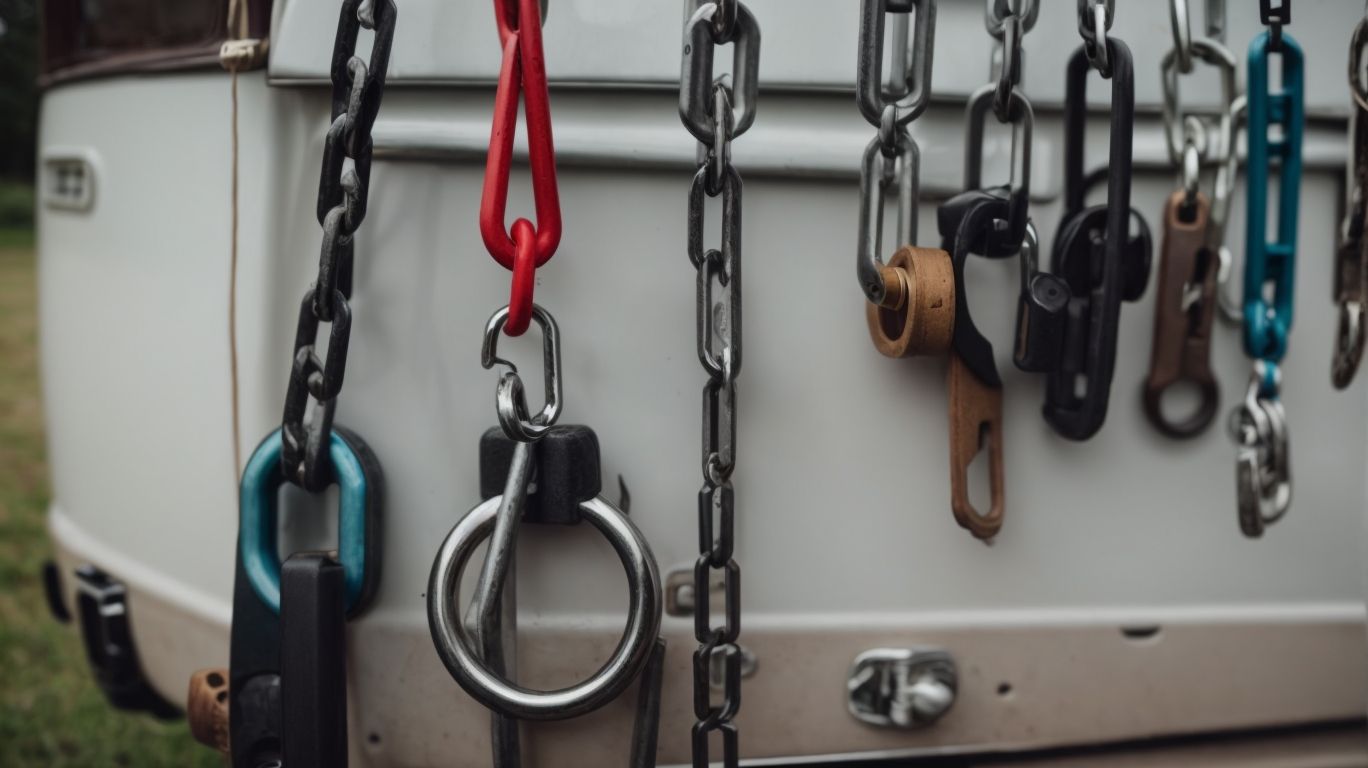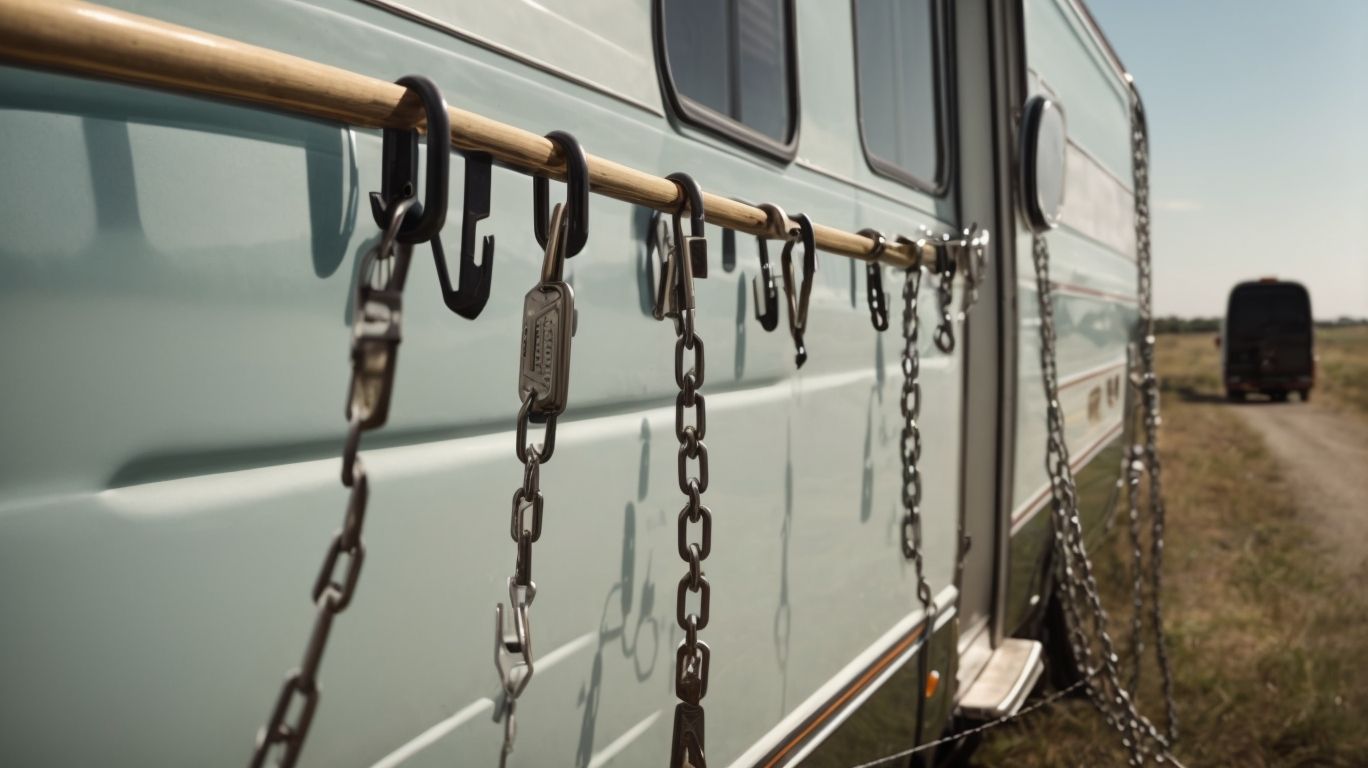Can You Attach Hooks on Caravan Chains? Safety Guidelines and Best Practices
Are you wondering whether it’s safe to attach hooks on caravan chains?
In this comprehensive article, we will explore the use of hooks on caravan chains, safety guidelines, best practices, risks of improper attachment, and alternatives.
From choosing the right size and type of hook to following weight capacity guidelines, we will cover everything you need to know to ensure a safe and secure towing experience.
Let’s dive in and learn more about this important aspect of caravan safety.
Key Takeaways:
What Are Caravan Chains?
Caravan chains are essential safety components that connect a trailer to a towing vehicle, providing added strength and security during towing operations.
These chains play a critical role in ensuring a stable connection between the vehicle and the trailer, especially during sudden stops or swerves. Choosing chains that are appropriately rated for the weight of the trailer and the towing capacity of the vehicle is crucial to prevent them from snapping and causing accidents. Caravan chains serve as a backup system in case the main hitch fails, adding an extra layer of protection and peace of mind for the driver. It is essential to regularly inspect and maintain these chains to uphold their effectiveness in the overall towing setup.
What Are Hooks Used For On Caravan Chains?
Hooks on caravan chains serve as connecting points to attach the chains securely to the towing vehicle and trailer, ensuring a reliable link between the two components.
Proper attachment and use of high-quality hooks are crucial in maintaining safety during towing. When hooks are securely fastened, they prevent accidental detachment of the safety chains, thereby minimizing the risk of the trailer separating from the towing vehicle in case of unforeseen circumstances. By providing a strong and dependable connection, these hooks not only ensure safe towing but also comply with road safety regulations.
It is essential for caravan owners and drivers to regularly inspect the hooks for any signs of wear or damage to guarantee their effectiveness in preventing accidents and maintaining road safety.
Is It Safe To Attach Hooks On Caravan Chains?
Attaching hooks on caravan chains is a safe practice when done correctly, as it ensures a strong and reliable connection between the towing vehicle and trailer.
One critical aspect to keep in mind when attaching hooks on caravan chains is the proper technique of connection. A secure attachment involves ensuring that the hook is correctly fastened onto the chain, without any loose or weak points. Utilizing safety chains of adequate strength rating is essential to bear the load during towing.
Failure to adhere to the recommended safety guidelines can pose significant risks. Improperly connected hooks may lead to detachment while on the road, resulting in accidents or damage to both the towing vehicle and the caravan.
What Are The Safety Guidelines For Attaching Hooks On Caravan Chains?
When attaching hooks on caravan chains, it is crucial to follow safety guidelines to ensure proper connection, especially considering the weight and towing capacity of the trailer and towing vehicle.
Choosing the right hook size and type plays a significant role in the safe attachment of the caravan chains. Ensure that the hook’s capacity matches or exceeds the weight of the trailer to prevent overloading and potential accidents. Securely fastening the hooks to the designated anchor points on both the vehicle and trailer is vital to maintain towing safety. Inspecting the hooks regularly for any signs of wear or damage and replacing them if needed is also essential to prevent breakdowns during towing. Always double-check the connections before hitting the road to ensure a secure setup.
What Are The Best Practices For Attaching Hooks On Caravan Chains?

Credits: Motorcaravanning.Com – Noah Baker
Adhering to best practices when attaching hooks on caravan chains is essential for ensuring a secure connection and maintaining towing safety, especially considering the weight and load limit of the trailer.
One of the key aspects of proper installation is selecting hooks that match the weight capacity of your caravan to avoid any potential risks during towing. It is crucial to securely fasten the hooks to the designated anchor points on both the vehicle and the caravan using appropriate hardware.
Regular maintenance of the hooks is also vital to prevent wear and tear, ensuring they remain in optimal condition for safe towing operations. Manufacturer guidelines should always be closely followed to guarantee the hooks are correctly attached and functioning as intended.
Choose The Right Size And Type Of Hook
Selecting the appropriate size and type of hook is crucial when attaching caravan chains, as it ensures a proper fit and secure connection based on the weight and towing requirements.
When choosing a hook for your caravan chains, you should first consider the weight rating of your trailer to ensure that the hook can withstand the load. Matching the weight capacity of the hook to your caravan’s maximum towing weight is essential for safe towing. The type of hook plays a significant role in how securely the chains are attached. For instance, a D-shackle or a grab hook can offer different levels of strength and stability.
Ensure Proper Installation
Proper installation of hooks on caravan chains is essential to guarantee secure attachments and reliable connections between the towing vehicle and trailer, minimizing the risk of accidents.
When installing hooks on caravan chains, the first step is to ensure that the hooks are the appropriate size and weight capacity for the caravan being towed. It’s recommended to use high-quality, durable hooks that can withstand the weight and stress of towing.
Next, carefully position the hooks on the caravan chain, making sure they are aligned correctly with the attachment points on the towing vehicle. Take the time to double-check the alignment to prevent any potential slipping or disconnection while on the road.
Regularly Inspect And Maintain Hooks And Chains
Regular inspection and maintenance of hooks and chains on caravan setups are vital for detecting any signs of wear or damage that could compromise towing safety.
These components play a crucial role in securing the caravan during transportation, so it is essential to ensure they are in good condition before embarking on any journey.
To properly inspect hooks and chains, check for visible signs of rust, corrosion, or deformation. Verify that all fasteners are securely tightened and that there are no loose connections. It is also recommended to lubricate moving parts to prevent friction and reduce wear over time.
Follow Weight Capacity Guidelines
Adhering to weight capacity guidelines is essential when attaching hooks on caravan chains to prevent overloading and ensure that the towing setup operates within safe limits.
When selecting hooks for caravan chains, ensuring they can handle the weight of your load is crucial to avoid potential safety hazards.
Exceeding weight limits can strain the hooks, leading to structural damage and putting the entire towing system at risk.
It’s not only about the hooks, but also ensuring that the chains themselves are rated for the maximum load they will bear.
By following the manufacturer’s recommendations and staying within weight capacities, you can help prevent accidents and maintain a safe towing experience.
Use Additional Safety Measures
Implementing additional safety measures, such as cross chains or auxiliary connections, can enhance the overall security of caravan setups and reduce the risk of accidents during towing.
Cross chains play a crucial role in preventing accidents caused by potential detachment of the trailer from the towing vehicle. These sturdy chains help to maintain a strong connection even if the primary hitch fails.
Auxiliary attachments like safety cables provide an added layer of security, especially during challenging driving conditions or sudden maneuvers. By incorporating these supplementary safety features, drivers can enjoy peace of mind knowing that their towing setup is reinforced and less vulnerable to unforeseen mishaps.
What Are The Risks Of Not Properly Attaching Hooks On Caravan Chains?
Failing to properly attach hooks on caravan chains can lead to significant risks, including accidents, damage to vehicles, and legal consequences due to unsafe towing practices.
When caravan hooks are not secured correctly, there is a higher likelihood of the chain coming loose during transit, potentially causing the caravan to detach from the towing vehicle, leading to dangerous accidents on the road. The sudden separation can not only endanger the lives of those inside the vehicle but also pose a threat to other motorists and pedestrians. The detachment can result in severe damage to both the caravan and the towing vehicle, incurring costly repairs and impacting insurance claims.
Failing to follow proper safety procedures can leave individuals legally accountable for any incidents that occur as a result of the improper attachment. This means facing potential legal repercussions, fines, and even lawsuits in case of accidents or property damage caused by the negligence of not securing the caravan chains adequately.
Accidents And Injuries
Improperly attached hooks on caravan chains can increase the likelihood of accidents and injuries, posing a serious risk to both the occupants of the vehicles and other road users.
When hooks are not securely fastened to the caravan chains, it can result in sudden detachment while in motion, leading to dangerous swaying or detachment of the caravan from the towing vehicle. This can cause loss of control, rollovers, or collisions, endangering lives and causing substantial damage.
Ensuring proper attachment and regular maintenance of caravan chains is paramount to prevent such incidents. Neglecting safety measures during towing can lead to legal liabilities and insurance complications in case of accidents.
Damage To The Caravan And Other Vehicles
Inadequate hook attachment on caravan chains can result in damage to the caravan, towing vehicle, or other vehicles on the road, leading to costly repairs and potential safety hazards.
When hooks are not securely attached to caravan chains, the caravan may become detached from the towing vehicle unexpectedly. This poses a significant risk not only to the caravan occupants but also to other motorists on the road. The sudden disconnection can cause the caravan to veer off course, potentially colliding with other vehicles or even causing a road obstruction.
A loose hook can cause jerking and swaying movements in the caravan, which can destabilize the towing vehicle and lead to loss of control. This scenario increases the likelihood of accidents and puts the lives of all road users in jeopardy.
Legal Consequences
Failure to properly attach hooks on caravan chains can result in legal consequences, as it may violate towing laws and regulations, potentially leading to fines, penalties, or legal liabilities.
When towing a caravan, ensuring that hooks are securely attached is not just a matter of convenience but crucial for safety and legal compliance. If the hooks are improperly attached, the entire caravan chain could detach while on the road, posing a significant hazard to other drivers and pedestrians.
From a legal standpoint, the responsibility lies with the driver to follow towing regulations diligently. Any negligence or oversight in hook attachment could not only lead to fines and penalties but also result in civil liabilities in case of accidents or damages caused due to the caravan becoming unhitched.
What Are The Alternatives To Using Hooks On Caravan Chains?
While hooks are commonly used to connect caravan chains, alternative attachment options include carabiners, ratchet straps, and screw locks, providing versatile and secure connection solutions.
Carabiners offer quick, snap-on attachment, making them ideal for temporary connections during short trips or when you need to frequently detach the caravan. On the other hand, ratchet straps provide a strong and adjustable connection, ensuring stability and tension control for heavier loads or longer journeys.
Screw locks are excellent for a semi-permanent attachment, offering a robust and secure link between the caravan and towing vehicle. Their added safety features make them suitable for rough terrains where vibrations can loosen traditional hooks, ensuring a reliable connection throughout the journey.
Carabiners
Carabiners offer an alternative attachment solution to hooks on caravan chains, providing secure and reliable connections between the towing vehicle and trailer for safe towing operations.
One of the key features of carabiners that make them highly favored for this purpose is their secure locking mechanisms. These mechanisms help prevent accidental disengagement, ensuring a stable connection throughout the towing journey. Carabiners are designed to be versatile, allowing them to be easily attached and detached from various anchor points on both the vehicle and the caravan.
Ratchet Straps
Ratchet straps serve as an effective alternative to hooks for attaching caravan chains, offering adjustable and secure connections that can be easily tightened for added stability during towing.
Ratchet straps are highly versatile tools that can be adjusted to fit various sizes of caravan chains, providing a customized fit for each towing situation. The ratchet mechanism enables users to apply precise tension, ensuring a tight and secure connection that minimizes the risk of detachment while on the road. This adjustable nature not only enhances safety but also allows for quick and efficient tightening, eliminating the hassle of dealing with hard-to-reach hooks or struggling with manual adjustments.
Screw Locks
Screw locks provide a reliable alternative to traditional hooks on caravan chains, offering a secure locking mechanism that ensures stable connections between the towing vehicle and trailer.
One of the key advantages of using screw locks in towing setups is their robust locking system, which reduces the risk of accidental detachment during transit. The threaded design of screw locks allows for a tight and secure connection, minimizing the chances of the caravan chains coming loose while on the road.
The use of screw locks enhances the overall safety of the towing process. By providing a strong and reliable attachment point, screw locks contribute to a more stable towing experience, decreasing the likelihood of unexpected swaying or separation between the vehicle and the trailer.
Frequently Asked Questions
Can you attach hooks on caravan chains?
Yes, you can attach hooks on caravan chains, but it is important to follow safety guidelines and best practices to ensure the safety of yourself and others on the road.
What are the safety guidelines for attaching hooks on caravan chains?
When attaching hooks on caravan chains, make sure the hooks are rated for the weight of your caravan and are securely attached to the chains. Also, ensure that the chains are properly attached to your vehicle and are not dragging on the ground.
Are there any specific best practices for attaching hooks on caravan chains?
Yes, it is recommended to use safety chains that have been specifically designed for towing caravans. These chains should be crossed under the A-frame of the caravan and then attached to the towbar of the vehicle.
Why is it important to properly attach hooks on caravan chains?
Properly attaching hooks on caravan chains helps to prevent the caravan from becoming detached from the vehicle while on the road. This is crucial for the safety of yourself and others on the road.
What should I do if I am unsure about how to properly attach hooks on my caravan chains?
If you are unsure about how to attach hooks on your caravan chains, it is best to seek advice or assistance from a professional. They can ensure that your hooks are properly attached and that your caravan is safe to tow.
Do I need to regularly check the attachment of hooks on my caravan chains?
Yes, it is important to regularly check the attachment of hooks on your caravan chains to ensure they are still secure and in good condition. This should be done before each trip and any signs of wear or damage should be addressed immediately.







